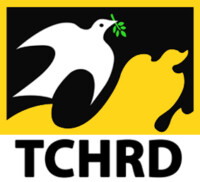Ngawang Jampa, aged 24 from Lhatse, Palbar Dzong, arrived in Dharamsala on 30 December 1996. He is one of the victims of the ongoing “strike hard” campaign presently being implemented by the authorities of the PRC. He was expelled from Lhatse Monastery and was then again expelled, along with 500 other monks, from Chamdo Monastery. The total number of known expulsions for 1996 in connection with “strike hard” now stands at 1295. Ngawang and other Tibetan monks are being denied the right to freedom of education and to practise and profess their religious belief. Ngawang Jampa was interviewed by TCHRD and recounted his expulsion and subsequent journey to freedom.
Ngawang Jampa joined Lhatse Monastery in 1985. He reports that there were a total of 75 monks in the monastery at that time. The first expulsion drive took place in Lhatse Monastery in May 1996, and 52 of the 75 monks have thus far been expelled. Ngawang Jampa was expelled in late May for his non-compliance with work team officials and his refusal to give his thumb print as a mark of agreement. In 1992 Ngawang Jampa joined Chamdo Monastery and remained there until his second expulsion in late 1996. During his stay in Chamdo he made annual visits to Lhatse Monastery. In 1996 when Ngawang Jampa visited Lhatse Monastery he was told by officials from the Religious Bureau and the Public Security Bureau that if he returned to Chamdo he would face expulsion. Ngawang replied that his studies were in Chamdo and therefore he would have to go back. As a result Ngawang Jampa’s name was withheld from the monastery’s master roll.
The Chinese campaign to educate the monks to be “country loving and religion loving” was launched in Chamdo Monastery in August 1996 with the arrival of a “work team” of 24 members. Later the monks were asked to go to the monastery of their respective district (Chinese: Sheng; Tibetan: Dzong) to continue their education campaign. Following the completion of the education campaign they were to receive permission from the district office before they could return to Chamdo Monastery. However it had reportedly already been decided by the authorities that such permission would not be granted. Ngawang Jampa had already been expelled from Lhatse Monastery, the monastery of his origin, and thus he had nowhere to go. He reports that, as a result of this campaign, 500 of the 1500 Chamdo monks were expelled and that novice monks below the age of 18 were certain to also face expulsion. While the expulsion of such novice monks has thus far not been implemented in Chamdo Monastery, this policy has already been carried out in Palbar Dzong.
Ngawang Jampa reports that initially the “work team” had planned to carry out the campaign at Chamdo for 40 days and to extend if the results were not satisfactory. There were 13 classes, each class with 60 to 180 monks, and the “work team” conducted one session at 2 p.m. and the next at 6 pm. Each class was conducted by two members of the work team and one person from the 30-member Monastery Management Committee.
During the 2 pm lesson the main focus was the five principles of the political pledge required from the monks: opposition to separatism; unity of Tibet and China; recognition of the Chinese- appointed Panchen Lama; denial of Tibet’s independence and denouncement of the Dalai Lama. The evening session focused on Chinese Communist ideology. Ngawang Jampa also provided testimony that:
- In February 1995 the Chinese authorities ordered the removal of all photos of the Dalai Lama from Chamdo Monastery. Each monk of Chamdo Monastery was ordered to submit one picture of His Holiness. When the monks refused, Chinese officials confiscated photos of the Dalai Lama from the monks’ quarters.
- In 1995, three monks of Chamdo Monastery were arrested for engaging in pro-independence activities. One of the monks named Soepa, originally from Tsa Zo-gar Dzong, was Ngawang’s classmate. The three monks are reportedly in Chamdo Prison.
Ngawang Jampa fled India with three other Chamdo monks who are now in Drepung, Sera and Ganden monastery in south India. Ngawang Jampa wishes to pursue his religious studies in Drepung Monastery in south India.
